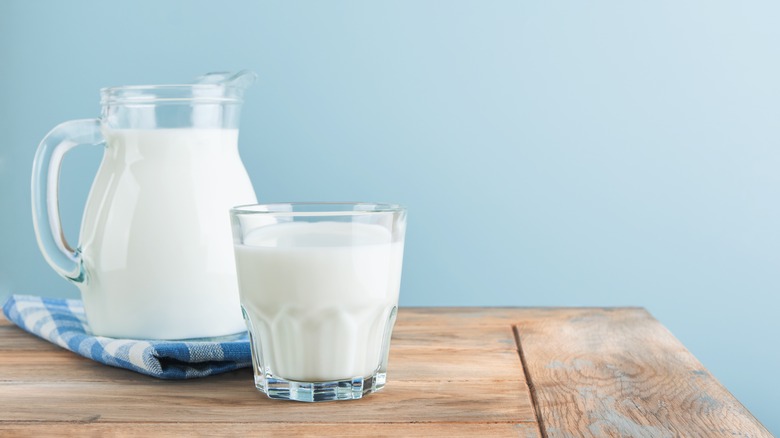Is Milk Really More Hydrating Than A Simple Glass Of Water?
It's a hot summer day and you're playing soccer out on some sun-baked field. You've been sweating, of course, and now you're parched. Taking a quick breather, you dig into a cooler on the sidelines and pull out an ice-cold bottle of ... milk?
Okay, so it may not hit like an ice-cold bottle of water. But milk — whole or skim — might be even more hydrating. That's according to a 2016 study in the American Journal of Clinical Nutrition in which a team of researchers from St. Andrew's University in the U.K. developed a "beverage hydration index" to judge the relative hydrating properties of a slew of drinks, from water to beer to soda. In the study, researchers took 72 male subjects and had them drink from a selection of 13 liquids, then measured their urine input compared to people who drank plain water. Less urine meant a higher beverage hydration index, or BHI — in other words, more fluid getting absorbed into the body.
It's important first to note that the study wasn't huge, so the conclusions aren't surefire. But out of 13 liquids under analysis, researchers found that four outperformed water when it came to keeping the body hydrated: whole milk, skim milk, orange juice, and oral rehydration solution — the type of stuff sold on pharmacy shelves under names like Pedialyte. Does this mean that milk is necessarily more hydrating than water? Not necessarily — more research is needed. However, it's an interesting piece of evidence about the hydration benefits of milk.
Milk's hydration potential is not proven
Some components of milk could theoretically give it a hydration edge over plain water. Milk contains a sugar called lactose, along with some other nutrients not found in water — protein, fat, and electrolytes like sodium and potassium. Together, those could potentially give a little heft to what you're drinking, slowing the movement of the liquid through the digestive system. As a carbohydrate, sugar can also help the small intestines absorb electrolytes before the bladder releases whatever is left over (along these lines, you can lessen the diuretic effect of a strong cup of coffee by adding a splash of milk to it).
The U.K. paper builds on the work of previous studies touting the hydrating properties of milk, though they've been criticized for their relatively small sample sizes. Harvard physician Robert H. Schmerling questions the hype around using dairy for hydration, pointing not just to the sample size issue, but also to the fact that none of the studies looked at the long-term hydration effects of milk. It's not known if the short-term benefits observed by the studies would last longer than a few hours. Furthermore, milk is high in calories — you can easily consume hundreds (or even thousands) of calories drinking enough milk to rehydrate yourself after strenuous exercise. Schmerling argues that for most people, drinking water when you're thirsty is sufficient for meeting your hydration needs. You might want to wait for more studies to come out before adding milk to your list of refreshing summer drinks.

